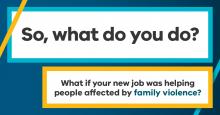About the attraction and recruitment campaign
Your organisation can help grow the family violence workforce in Victoria.
The ‘So, what do you do?’ campaign aims to generate interest in the family violence sector and prompt action from students, graduates and professionals who have the qualities and skills the sector needs.
The campaign was developed by Family Safety Victoria in close partnership with the sector, and was informed by research over several months involving potential candidates, family violence workers and stakeholders.
Campaign research key findings
As part of developing the campaign, we talked to students, professionals who were open to a career change, existing family violence workers and key stakeholders - to understand:
- Knowledge of family violence and primary prevention work.
- Drivers to consideration and investigation of family violence roles.
- Responses to roles and take-up pathways.
- Differences for potential audience groups.
- How to instil a feeling of pride in existing workforce.
Potential candidates want to know that:
- the types of work, roles and organisations in the family violence sector are diverse
- they will work with a team
- they will learn from by inspirational colleagues
- they will be supported, particularly if they have previously experienced trauma
- the sector is well funded and supported by government
- working in family violence is about driving positive change for families
Further research insights are available below.
Campaign opportunities
The campaign aims to:
- Establish that the family violence sector exists and how the sector works with or meets the needs of our community.
- Promote Victorian Government investment and commitment to develop the family violence workforce and emphasise the range of jobs available.
- Alleviate the fears of those who come to the sector with experience of trauma by outlining how they will be supported in their roles.
- Address people’s lack of confidence by creating a sense that they will be valued and supported.
- Emphasise that the sector seeks cultural diversity in its workforce because it serves culturally diverse communities.
- Highlight that training and frameworks are provided to support people in the sector to manage their own and other’s safety.
- Upload and promote job vacancies on the Family Violence Jobs Portal.
Help us spread the message
On this page you will find resources and information to help you attract and retain great people and ways you can spread the campaign messages far and wide.
Animated videos
These animated videos on YouTube can be shared on your social media channels to boost the campaign or be used in your recruitment communications.
For career changers who want to work in family violence(opens in a new window)
For students and graduates who want to work in family violence (female voice)(opens in a new window)
For students and graduates who want to work in family violence (male voice)(opens in a new window)
A day in the life videos
These videos follow workers in the family violence and sexual assault sector and have them explain what a typical day looks like in their role, what motivates them and why they love what they do They can be used in your recruitment communications, including in job advertisements or linked to position descriptions.
Posters to download and display
Career changers
Students and graduates
Aboriginal organisations
Social media tiles
These images have been designed for social media platforms. Use them in combination with the sample posts below to spread the campaign messages or to add interest when sharing a job vacancy. Download the zip file below for the collection of images.
Social media sample posts
- ‘So, what do you do?’ It can be a tough question to answer, no matter how you interpret it.
- Have you seen the new #SoWhatDoYouDo? campaign from #FamilySafetyVictoria?
- Have you checked out Victoria’s new #FamilyViolenceJobs website yet? It links to a range of family violence jobs in government and not-for-profit organisations in Victoria. It also provides information and resources to help potential candidates understand the diverse roles, organisations and people that make up the family violence sector. Visit familyviolence.vic.gov.au/jobs to find out more.
- If you have #FamilyViolenceJobs to advertise, make sure they’re on Victoria’s new Family Violence Jobs Portal. The jobs portal makes it easy for people who aren’t currently working in the sector to find out more about family violence work and see what roles are available. Have a look at familyviolence.vic.gov.au/jobs.
- From social workers and educators, to communicators and researchers – the family violence sector needs people for roles as diverse as the communities we serve.
- What if your new job was helping families affected by family violence? Right now across Victoria there are opportunities available for people who want to be part of a team working to make positive change and end family violence.
- The family violence sector needs culturally competent people in its workforce because it serves culturally diverse communities. If you have experience working with culturally diverse audiences including Aboriginal, disability and LGBTIQ individuals and communities, there a range of family violence jobs in government, private and not-for-profit organisations in Victoria that could be right for you. Visit familyviolence.vic.gov.au/jobs to see what’s available.
- Victoria is investing to grow its family violence workforce. It needs people with lived experience of family violence who want to be part of a supportive team working to make positive change. Visit familyviolence.vic.gov.au/jobs to see the range of roles available.
- People with lived experience of family violence are a vital part of Victoria’s family violence workforce. If you’re looking for a career that’s meaningful, challenging and rewarding, visit familyviolencejobs.vic.gov.au to see the range of roles available.
Social media hashtags and tags
- #SoWhatDoYouDo?
- #SoWhatsNext?
- #FamilyViolenceJobs
- #EndFamilyViolence
- LinkedIn: familysafetyvictoria
- Twitter: @FamilySafetyVic
Using the campaign resources
Recruitment messages
These recruitment messages can be used when you are targeting specific audiences, such as career changers and students or graduates. You can use them in your recruitment advertisements and position descriptions. You can also use these to promote job opportunities on your website.
Career changers
- Are you thinking about a career change? What if your new job was helping families affected by family violence?
- Are you thinking about a career change? What if your new job was supporting women and children affected by family violence?
- Are you thinking about a career change? What if your new job was preventing family violence?
- Are you thinking about a career change? What if your new job was working with men who use family violence?
- We’re hiring. For more information about this role visit familyviolence.vic.gov.au/jobs
- <Another organisation> is hiring. For more information about this role visit familyviolence.vic.gov.au/jobs
Graduates and students
- Thinking about what’s next after your studies? What if your new job was helping families affected by family violence?
- Thinking about what’s next after your studies? What if your new job was supporting women and children affected by family violence?
- Thinking about what’s next after your studies? What if your new job was preventing family violence?
- Thinking about what’s next after your studies? What if your new job was working with men who use family violence?
- We’re hiring. For more information about this role visit familyviolence.vic.gov.au/jobs
Family violence workers
- Are you working in family violence, want to stay in the sector, but feel like a change?
- Discover the range of roles available across Victoria. Visit the new family violence recruitment website at familyviolence.vic.gov.au/jobs
Talk to us
- You are very welcome to contact us if you have questions about the role, our organisation, how we support our staff, or how you could transfer your skills into this role.
- Contact <Name>, our <Position title> at <email address and/or phone number> for a confidential discussion.
Using the Family Violence Jobs Portal
Upload your vacancies to the Family Violence Jobs Portal(opens in a new window). An online employer guide(opens in a new window) is available or you can download the manual.
To understand who can use the portal and for what type of roles see vacancies accepted on Family Violence Jobs Portal.
Review your recruitment practices
Consider:
- Whether a jobseeker can call you to discuss the role.
- Highlighting the benefits of working for your organisation
- Whether you are looking for diverse, representative candidates.
- Including relevant campaign key messages in your recruitment communications.
- Using the job advertisement template when recruiting staff.
- Working with universities to offer placements or part-time work, or participate in career expos or talks.
- Working with high schools to offer career talks about what it’s like to work in family violence.
- Collaborating with other family violence organisations to offer rotations for staff who would benefit from a change in role.
Insights from research findings
Campaign kit
The information presented on this page is contained in the Campaign kit for family violence organisations in Victoria.
Contact us
For more information on the campaign or to get in touch with the Centre for Workforce Excellence, please email: cwe@familysafety.vic.gov.au
Updated

